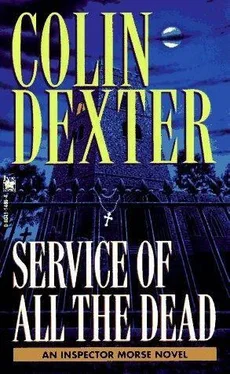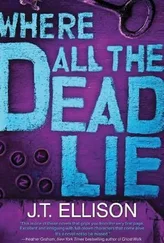Colin Dexter - Service of all the dead
Здесь есть возможность читать онлайн «Colin Dexter - Service of all the dead» весь текст электронной книги совершенно бесплатно (целиком полную версию без сокращений). В некоторых случаях можно слушать аудио, скачать через торрент в формате fb2 и присутствует краткое содержание. Жанр: Триллер, на английском языке. Описание произведения, (предисловие) а так же отзывы посетителей доступны на портале библиотеки ЛибКат.
- Название:Service of all the dead
- Автор:
- Жанр:
- Год:неизвестен
- ISBN:нет данных
- Рейтинг книги:3 / 5. Голосов: 1
-
Избранное:Добавить в избранное
- Отзывы:
-
Ваша оценка:
- 60
- 1
- 2
- 3
- 4
- 5
Service of all the dead: краткое содержание, описание и аннотация
Предлагаем к чтению аннотацию, описание, краткое содержание или предисловие (зависит от того, что написал сам автор книги «Service of all the dead»). Если вы не нашли необходимую информацию о книге — напишите в комментариях, мы постараемся отыскать её.
Service of all the dead — читать онлайн бесплатно полную книгу (весь текст) целиком
Ниже представлен текст книги, разбитый по страницам. Система сохранения места последней прочитанной страницы, позволяет с удобством читать онлайн бесплатно книгу «Service of all the dead», без необходимости каждый раз заново искать на чём Вы остановились. Поставьте закладку, и сможете в любой момент перейти на страницу, на которой закончили чтение.
Интервал:
Закладка:
Chapter Forty-two
Extract from the transcript of proceedings held on 4 July at Oxford Crown Court against Miss Ruth Isabel Rawlinson on the charges of perjury and conspiracy, Mr Gilbert Marshall, Q.C., prosecuting for the Crown, Mr Anthony Johns, Q.C., acting for the defence.
Marshall: Let us turn, if we can, away from these rather nebulous areas of motive, and come to the events of last September, specifically to the evening of Monday the twenty-sixth of that month. The Court will be glad, I know, to hear your own explanation of the events which took place that unholy night.
Morse: It is my view, sir, that a conspiracy had been formed to murder Mr Philip Lawson, and that this conspiracy involved the Reverend Lionel Lawson, Mr Paul Morris and Mr Harry Josephs. I am quite sure in my own mind that the statement made by the defendant about the events of that evening is substantially correct. Correct, that is, as far as it goes, since I am convinced that Miss Rawlinson was not in a position to know the detailed sequence of events, being neither an active party in, nor an actual witness to, the murder itself.
Marshall: Try to confine yourself to the question, Inspector, will you? It is for the Court to determine the degree of the defendant's involvement in this crime – not for you. Please continue.
Morse: If I were to guess the sequence of events that night, sir, it would have to be something like this. Lionel Lawson was able somehow to persuade his brother Philip that it would be greatly to his advantage to be in the church at a certain time that evening. It would have been no great problem to persuade him to drink a glass of red wine whilst they waited there – wine that had already been doctored with morphine. The fact that the man found dead at the church that night could have died, or certainly would have died, of morphine poisoning was clearly established by the post-mortem findings; but the provenance of the morphine itself was never discovered, in spite of extensive police enquiries. However, there was one of the three men who had earlier had direct and daily access to a complete pharmacopoeia, a man who had worked for eighteen months as a chemist's assistant in Oxford. That man, sir, was Harry Josephs. And it was Josephs, who, in my view, not only suggested but actually administered the lethal dose of morphine in the wine.
Marshall: Can you tell us why, if the man was already dead, it was necessary to stab him into the bargain?
Morse: I don't think he was already dead, sir, although I agree he would have been unconscious fairly soon after drinking the wine. Whatever happened, though, he had to be dead when the police arrived, because there might always be the outside chance of his recovering and telling the police what he knew. Hence the knife. And so if I may say so, sir, the key question is not why he was stabbed in the back – but why he was given morphine. And in my considered view the reason was this: it was absolutely vital from Lionel Lawson's point of view that his brother's clothes should be changed, and you can't stab a man in the back and then change his clothes without removing the knife and stabbing him again. By arrangement, Josephs had changed from the brown suit which by all accounts he always wore and brought it with him to the church that night. Without any doubt, I should think, the suit was wrapped up in the brown-paper parcel which Miss Rawlinson mentions in her statement. The police would obviously examine the dead man's clothes in the minutest detail, and an actual change of clothes would be the one certain way of making the deception appear absolutely authentic. And so, when Philip Lawson had slumped unconscious in the vestry, his own clothes were removed and Josephs' clothes put on him – a difficult and lengthy job, I should imagine, but there were three of them to do it and time was very much on their side. Then they dressed him in Josephs' cassock and the moment of truth had now arrived for Lionel Lawson. I suspect that he asked the other two to leave him, and then he completed a task which he had attempted once before and in which he had failed so disastrously. He looked down on the brother he had hated for so long, and he stabbed him in the back with his paper-knife. As I say, I don't myself think that Philip Lawson was dead at that point, and the defendant's statement tends to confirm this view, since what she heard must almost certainly have been the dying man's final groans. The police were summoned immediately, the body wrongly identified, both by the defendant and by Paul Morris, and I think you know the rest, sir.
Marshall: Doesn't all this seem to you an extraordinarily complicated business, Inspector? To me, at least, it seems quite ludicrously so. Why didn't the Reverend Lionel Lawson just murder his brother himself?
Judge: It is my duty to remind prosecuting counsel that it is not the Reverend Mr Lawson who is on trial in this court, and it is improper for the witness to answer the question in the form in which it has been phrased.
Marshall: Thank you, m'lord. Will the witness please explain to the Court why, in his view, the Reverend Mr Lawson, supposing him to have been responsible for his brother's death, did not proceed in this matter in a significantly more simple manner?
Morse: In my opinion, sir, two things were absolutely imperative for the Reverend Lawson. First that his brother should die – a matter which, as you suggest, he could perhaps have coped with singlehandedly all right if he'd tried. But the second imperative need was far trickier, and one which he could never have coped with by himself, however hard he tried. He had to have someone who was willing to be identified as the dead man and who was also prepared to disappear immediately from the Oxford scene. Let me explain, sir, why I think this was so. Philip Lawson had let it be known to several people, including the defendant, for example, that he was Lionel Lawson's brother. So if he had been murdered and identified as the man who had often been seen at the vicarage, in the church, and so on, it would only have been a matter of time before the police discovered his true identity. And once that was known other facts would have been swift to follow. An attempt had already been made upon the man's life once before – with a knife – by his elder brother. Police enquiries would very quickly have been channelled in the right direction and virtually certain suspicion would have centred on the Reverend Lawson. As I say, sir, it was absolutely vital not only that Philip Lawson should die but also that he should be wrongly identified. As the Court now knows, he was indeed wrongly identified – as Harry Josephs; and Harry Josephs himself disappeared from the scene, although as it happens he didn't disappear very far. That same night he moved into the upstairs flat at 14B Manning Terrace, and he lived there until he died. He'd taken Philip Lawson's clothes from the church and no doubt the idea was that he should destroy them. But for various reasons Josephs grew restless-
Marshall: Before you go on with your evidence, Inspector, I must ask you if it is your view that the defendant's relations with Mr Josephs had ever been in any way more – shall we say? – more intimate than merely providing him with the daily necessities of living?
Morse: No.
Marshall: You are aware, no doubt, of the evidence before the Court from an earlier witness of several visits by Mr Josephs to Manning Terrace during the course of last summer?
Morse: I am, sir.
Marshall: And it is your view that these visits were of a purely – er – purely social nature?
Morse: It is, sir.
Marshall: Please continue, Inspector.
Читать дальшеИнтервал:
Закладка:
Похожие книги на «Service of all the dead»
Представляем Вашему вниманию похожие книги на «Service of all the dead» списком для выбора. Мы отобрали схожую по названию и смыслу литературу в надежде предоставить читателям больше вариантов отыскать новые, интересные, ещё непрочитанные произведения.
Обсуждение, отзывы о книге «Service of all the dead» и просто собственные мнения читателей. Оставьте ваши комментарии, напишите, что Вы думаете о произведении, его смысле или главных героях. Укажите что конкретно понравилось, а что нет, и почему Вы так считаете.












